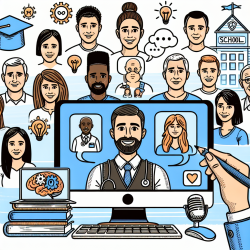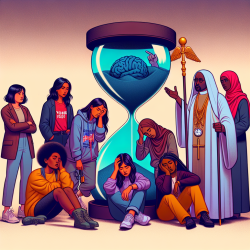Introduction
As speech-language pathologists, our goal is to foster effective communication and ensure that all individuals, regardless of hearing ability, have the tools they need to succeed. The recent study titled Exploring accommodations along the education to employment pathway for deaf and hard of hearing healthcare professionals offers valuable insights into the experiences of deaf and hard of hearing (DHH) individuals in healthcare education and employment. This blog explores how practitioners can leverage these findings to improve their practice and support DHH individuals more effectively.
Understanding the Challenges
The study highlights that DHH individuals face significant barriers in healthcare education and employment, primarily due to inadequate accommodations. Only 50% of respondents were highly satisfied with the accommodations provided during their education, and satisfaction with accommodations was directly linked to successful employment and mental wellness.
Key barriers identified include:
- Inconsistent use and effectiveness of accommodations across educational and employment stages.
- Lack of specialized disability resource providers (DRPs) in healthcare settings.
- Significant time spent by DHH individuals managing their accommodations.
Actionable Insights for Practitioners
To improve outcomes for DHH individuals, practitioners should consider the following strategies:
- Enhance DRP Expertise: Ensure that DRPs have specialized knowledge in healthcare settings to provide tailored accommodations that meet the unique needs of DHH students and professionals.
- Streamline Accommodation Processes: Reduce the administrative burden on DHH individuals by simplifying the process of requesting and managing accommodations.
- Promote Inclusive Policies: Advocate for clear policies and procedures that support the disclosure of disabilities and the request for accommodations without stigma.
- Foster a Supportive Environment: Create a learning and working environment that values diversity and actively supports DHH individuals through mentorship and peer support networks.
Encouraging Further Research
While the study provides a comprehensive overview of the challenges faced by DHH individuals, further research is needed to explore the long-term impacts of effective accommodations on career progression and mental health. Practitioners are encouraged to engage in or support research initiatives that aim to develop innovative accommodation solutions and measure their effectiveness.
Conclusion
By implementing the insights from this study, practitioners can play a crucial role in improving the educational and employment experiences of DHH individuals in healthcare. As we strive for a more inclusive and diverse workforce, it is imperative to ensure that all individuals have equal opportunities to succeed.
To read the original research paper, please follow this link: Exploring accommodations along the education to employment pathway for deaf and hard of hearing healthcare professionals.










